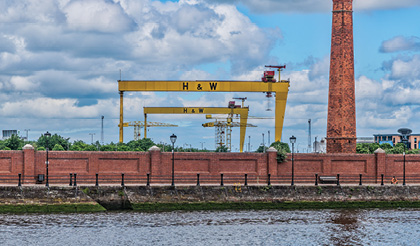Ulster Protestant identities


Unionism has come under renewed scrutiny amid the Tory-DUP confidence and supply arrangement. However, in the face of simplistic interpretations, the nuances and historical legacy of Protestant identities in Northern Ireland are a bulwark against the reductive labels being applied. Connal Parr, a Vice Chancellor’s Research Fellow in the Humanities at Northumbria University, writes.
Following the Westminster general election of last June, when Arlene Foster’s Democratic Unionist Party agreed to prop up a Conservative government, people outside Northern Ireland began taking a sudden interest in Ulster Protestant politics. Youthful BBC presenters marched back to Northern Ireland – where once the Troubles had brought them in spades – to walk among the bonfires on eleventh night asking, quite literally, ‘Who are the DUP? What do their supporters want?’ What indeed are the politics and culture of this group?
For a start, we are dealing with a diverse subject considerably bigger than the DUP. By assuming that Ulster Protestantism is uniformly represented by this party and located in Orange culture, the television presenters themselves contribute to the problem, as do a legion of academics and journalists who return repeatedly to the self-appointed spokespersons for comment, assuming they represent the entire so-called ‘PUL’ (‘Protestant/Unionist/Loyalist’) community.
Therefore, it became clear as I wrote my book Inventing the Myth that the most accurate portraits of this group were not being provided by its politicians and hardliners. Research published by the University of Liverpool in August 2017 showed that the social and political views of Protestants under the age of 40 are not reflected by the mainstream Unionist parties (most simply do not vote). This is one of the reasons why it is worth looking outside the official political sphere, which is content in its brokenness and division, to those working in the community and creative sectors.
But there was something else. With the language of socialism adopted by Irish nationalists, a number of Protestants have responded by emphasising their conservative, right-wing tendencies, adamant that their politics are the reverse of ‘themuns’. They have abandoned their own progressive, left-wing history, from the Presbyterian radicalism of the United Irishmen to the Northern Ireland Labour Party: a socialist party with a distinctly Protestant ethos that drew cross-community support. Many of the writers considered in my book brought to life the Protestant community’s left-wing or class-conscious past.
The central myth addressed – and hopefully demolished – is that Ulster Protestants lack any culture to speak of outside of the Orange Order. The hard evidence comes in the form of numerous Protestant writers: dramatists, poets, and novelists, all offering an alternative culture. Playwrights especially are natural dissenters and will suffer the consequences. Shipyard painter Sam Thompson once said: “A writer is not considered as part of the community. If you are a writer and you speak your mind, you’re a danger here.”
Thompson’s play Over the Bridge tackled sectarianism in the shipyards in the teeth of an establishment which attempted to suppress it and an uninterested middle-class. The play was rapturously received at the old Empire theatre in January 1960, where it was seen over the course of six weeks by over 42,000 people, most of them workers who had never before set foot in the theatre.
Another who faced the danger was Rathcoole-born Gary Mitchell, whose house and car were petrol-bombed in 2005 by a breakaway UDA group. Towards the end of the 1990s he was exploring divisions within Loyalism in plays such as In A Little World of Our Own and As the Beast Sleeps. These were dark but electrifying works which captured the ambiguous charisma of the paramilitaries he had been around all his life. Mitchell’s experience highlights the risk many writers take in capturing their own community and putting it on stage, even though in many ways his works humanised those behind the balaclavas.
Mitchell claims that great drama thrives on conflict “and there’s no more conflicted people than the Protestant community. Every person has a row every day, so there’s great drama springing up all around you”.

In June 2016, east Belfast-born actor and director Dan Gordon fronted a documentary called In The Shadow of the Shipyard which focused on several east Belfast playwrights: St John Ervine, Thomas Carnduff, Sam Thompson, and Stewart Parker. All feature as chapters in my book alongside Mitchell, Graham Reid, Ron Hutchinson, Christina Reid and Marie Jones.
If I to have written the book today, more women would now be included, as playwrights such as Rosemary Jenkinson and Stacey Gregg have since emerged. What is on the decline is a working-class identity, which makes the emergence in the 1980s of Marie Jones and the late Christina Reid all the more extraordinary. Both grew up in Protestant parts of Belfast, remaining deeply in touch with their roots despite their later successes. Orangeism, sectarian division, and working-class history and culture all mark their plays, reflecting a life which is not found in the official reports, Hansards, or even the newspapers. And because many unionist politicians have, again, traditionally assumed that the only place for women is in the home, Jones and Reid are vital in articulating female voices which could so easily be lost.
Many are familiar with the final writer considered: John Hewitt. Though more a poet than a playwright (and, unlike the others, middle-class), he also wrote plays and led by his intellectual example. Like Sam Thompson, Hewitt clashed with the Unionist authorities and left for Coventry in 1957 before returning to Belfast at the height of the Troubles to die in his city. Hewitt’s name continues on trough the bar named after him in Belfast, and he was even referenced by Irish Taoiseach Leo Varadkar in a speech at Queen’s University Belfast in August 2017. The new Irish premier quoted Hewitt’s preference for ‘multiple identities’, but neglected to mention Hewitt’s identity as a proud supporter of the labour movement!
Younger dramatists including Stacey Gregg, David Ireland, and Rosemary Jenkinson might be seen to be continuing the lineage of Ulster Protestant playwrights. Of course this particular binary label is not the main thing that defines them, but it’s a point which might be raised to combat the sheer ignorance of local politicians who publicly declare that working-class Protestants do not ‘buy into’ the arts, as the DUP’s William Humphrey ignorantly claimed in October 2013.
Aside from ignoring all the names above, Humphrey made this statement a matter of days before residents of the Shankill area staged the community play Crimea Square – a sprawling work covering a hundred years of history. They wrote it themselves and played it with help from theatre professionals (including Marie Jones) at the Shankill’s Spectrum Centre.
As so often in Northern Ireland, the people are ahead of the politicians. They vote with their feet in continuing to be entertained and challenged by those Protestant working-class writers who represent a culture beyond the flute bands and Lambeg drums.





